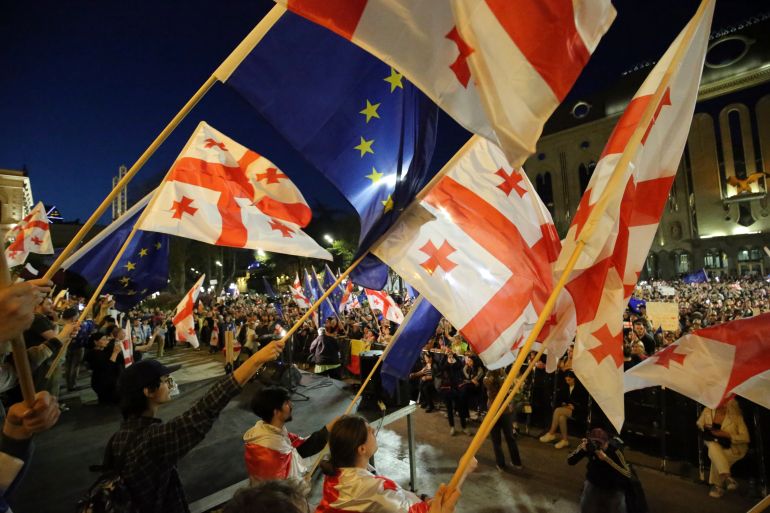- April 18, 2024
- Posted by: humanitarianweb
- Category: Humanitarian News
The ruling party suddenly reintroduced the bill earlier this month, after mass protests forced its withdrawal last year.

The Georgian parliament has advanced a controversial “foreign influence” bill through its first reading, as thousands joined a third day of anti-government protests.
The bill, first presented early in 2023 and withdrawn amid fierce public opposition, requires media and civil society groups to register as being under “foreign influence” if they get more than 20 percent of their funding from overseas.
Critics say the bill mirrors a repressive Russian law on “foreign agents” that has been used against independent news media and groups seen as being at odds with the Kremlin and will undermine Tbilisi’s aspirations for closer European Union ties and, ultimately, membership.
In a vote boycotted by the opposition in the 150-seat parliament, 83 politicians from the ruling Georgian Dream party backed the bill.
Some 20,000 people blocked traffic in front of the parliament building in the capital, Tbilisi, to show their opposition to the measure.
“No to the Russian law!” they shouted after listening to the Georgian national anthem and European Union’s Ode to Joy.
Speaking at the rally, opposition member of parliament Aleksandre Ellisashvili condemned politicians who voted for the bill as “traitors” and said the rest of Georgia would show them that “people are power, and not the traitor government”.
The Black Sea nation was once part of the Soviet Union but secured its independence in 1991 as the USSR collapsed.
Once seen as a democratic reformer, the current ruling party led by Prime Minister Irakli Kobakhidze has been accused of trying to steer Georgia towards closer ties with Russia.
“Today is a sad day for Georgia because our government has taken another step towards Russia and away from Europe,” protester Makvala Naskidashvili told the AFP news agency.
“But I am also happy because I see such unity among the youth,” the 88-year-old added. “They are proud Europeans and will not let anyone spoil their European dream.”
Protest rallies were also held in several other cities across Georgia, including the second largest city of Batumi, Interpress news agency reported.
Derailing Georgia
Thousands have been taking to the streets of Tbilisi since Monday to show their opposition to the draft law with riot police chasing demonstrators through the labyrinth of narrow streets near parliament, beating them and making arrests.
Kobakhidze, known for anti-Western rhetoric while insisting that he is committed to Georgia’s European aspirations, said the law would boost the financial transparency of NGOs funded by Western institutions.
The only change in wording from the previous draft says organisations that receive 20 percent or more of their funding from overseas would have to register as “pursuing the interests of a foreign power” rather than as “agents of foreign influence”.
In an online statement on Wednesday, EU foreign policy chief Josep Borrell described the bill’s passage through parliament as “a very concerning development” and warned that “the final adoption of this legislation would negatively impact Georgia’s progress on its EU path”.
“This law is not in line with EU core norms and values,” Borrell said, stressing that the country’s “vibrant civil society” was a key part of its bid for EU membership.
Washington has also voiced concerns that the law would “derail Georgia from its European path”.
Amnesty International urged Georgia’s authorities to “immediately stop their incessant efforts to impose repressive legislation on the country’s vibrant civil society.”
The ruling Georgian Dream party reintroduced the bill to parliament earlier this month, in a surprise announcement ahead of parliamentary elections in October.
To become law, the bill has to pass second and third readings in parliament and secure presidential backing.
But Georgian Dream’s commanding majority in the legislature means it would be able to pass those further stages and vote down a presidential veto.
